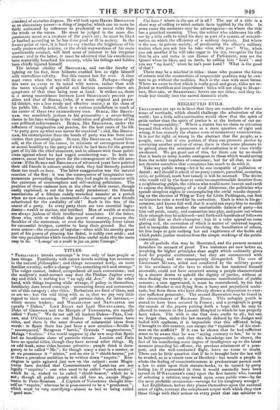TITLES.
" FAMILIARITY breeds contempt" is true only of base people or base things. Familiarity with nature breeds nothing but reverence in the natural philosopher ; and things accounted lowly, on more familiar scrutiny, suffer a change "into something rich and strange." The vulgar cannot, indeed, comprehend all such conversions ; and the sculptor's maid-servant may dust the Phidian Jupiter every day and think it nothing but "an ugly old Jew." On the other hand, with things imposing while strange, if paltry in themselves, familiarity does breed contempt : unmeaning forms and ceremonies are of this category ; also titles. Barbarians are fond of them, and so are we ; but the odd thing with us is, that we pay very little regard to their meaning. We call persons dukes, for instance,— which means leaders ; and WELLINGTON and NEWCASTLE are equally "Dukes." Lord BACON and Lord MOUNTCASHEL, the Duke of ORMONDE and the Marquis of TOWNSHEND, are equally called " Peers." We do not call all leaders Dukes—PEEL, COD' DEN, and O'CONNELL are not Dukes. Places sometimes have titles, and there is the same divorce of substantial ideas from words : in Spain there has just been a new creation—Seville is "unconquered," Saragossa "heroic," Grenada " magnanimous," Malaga "fearless." One would suppose by the new map that Spain had an inordinate share of patriotic virtues. London and Paris have no special titles, though they have several other things. By an odd freak, some titles become privative : people think it derogatory to be called "Mr."; for though many a man is a master, or as we pronounce it " mister," and no one is " shield-bearer," yet is there a prevalent ambition to be written down "esquire." Kensington is quite agitated just now on the subject : some Magistrates have decided that Commissioners of Land-tax are not legally " esquires" : one who used to be called "coach-master," which he is, wished to be called "shield-bearer," which he is not ; though all polite people will call him so, except Magistrates in Petit-Sessions. A Captain of Volunteers thought himself an "esquire," whereas he is pronounced to be a " gentleman" ; which must be very mortifying—almost as bad as being called "good man." Cui bono f where is the use of it all ? The use of a title is a short way of calling to mind certain facts typified by the title. In some eases the memento may be advantageous—as where the title has a practical meaning. Thus the soldier who addresses his officer by a title calls to mind his duty as part of a system of subordi, nation on which the efficiency of a soldiery depends. But where is the use, in private society, of predicating the officer's military station when you ask him to take wine with YOU? Why, when you ask another if he will take sugar in his tea, recognize the fact that he sits and votes in one House of Parliament, may see the Queen when he likes, and so forth, by calling him " Lord" : and you say "my Lord," when he isn't your Lord ? What is the good of that ?
There may be a mischief in titles: those who possess the forms of esteem and the counterfeits of respectable qualities may be content to go without the realities. Such is the case with most forms. Where we come to that which is really good and great, titles are rejected as worthless and impertinent : titles will not cling to MaurDEN, HOWARD, or SHAKSPERE ; lovers use not titles; and they intrude but timidly into the sacred domestic circle.


























 Previous page
Previous page